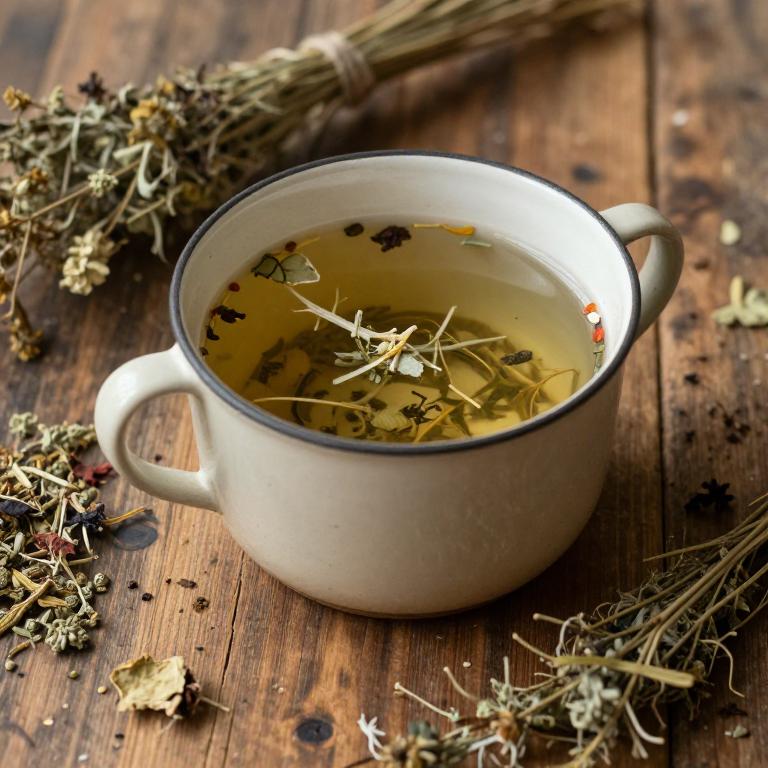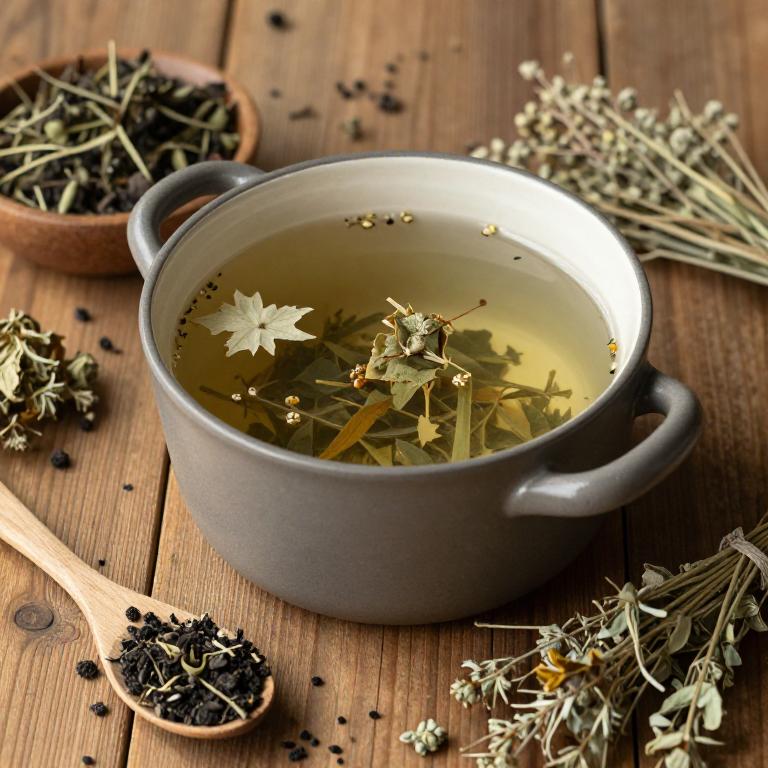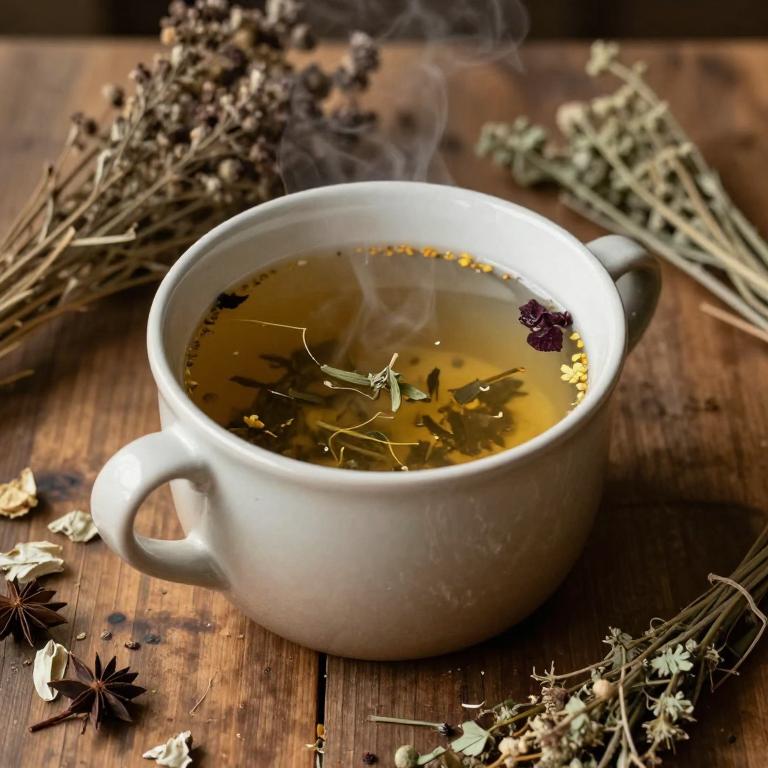10 Best Herbal Decoctions For Edema

Herbal decoctions have been traditionally used to manage edema by promoting lymphatic drainage and reducing fluid retention.
Common herbs such as dandelion, parsley, and ginger are often included in these decoctions due to their diuretic properties. These herbal preparations work by supporting kidney function and enhancing the elimination of excess fluids from the body. They are typically prepared by simmering dried herbs in water for an extended period to extract their active compounds.
While herbal decoctions can be a natural complement to conventional treatments, it is important to consult a healthcare provider before use, especially for individuals with pre-existing medical conditions or those taking medications.
Table of Contents
- 1. Thistle (Silybum marianum)
- 2. Stinging nettle (Urtica dioica)
- 3. Dog rose (Rosa canina)
- 4. Blessed thistle (Cnicus benedictus)
- 5. Chaste tree (Vitex agnus-castus)
- 6. Yarrow (Achillea millefolium)
- 7. White water lily (Nymphaea alba)
- 8. Common grape (Vitis vinifera)
- 9. Garlic (Allium sativum)
- 10. Field horsetail (Equisetum arvense)
1. Thistle (Silybum marianum)

Silybum marianum, commonly known as milk thistle, is a herbal remedy that has been studied for its potential benefits in managing edema, which is the accumulation of excess fluid in tissues.
The active compound in milk thistle, silymarin, is believed to exert anti-inflammatory and antioxidant effects that may help reduce swelling and fluid retention. Herbal decoctions made from the seeds of Silybum marianum are often prepared by simmering the dried seeds in water, resulting in a concentrated tea that can be consumed internally. While some preliminary research suggests that milk thistle may support liver function and indirectly aid in reducing edema, more clinical studies are needed to confirm its efficacy and safety for this specific use.
As with any herbal remedy, it is advisable to consult a healthcare professional before using Silybum marianum, especially for individuals with existing medical conditions or those taking other medications.
2. Stinging nettle (Urtica dioica)

Urtica dioica, commonly known as stinging nettle, has been traditionally used in herbal medicine for its potential diuretic properties, which may help alleviate edema by promoting the elimination of excess fluids from the body.
When prepared as a decoction, the leaves and stems of Urtica dioica are simmered in water to extract their active compounds, including minerals like potassium and magnesium, which support fluid balance. Some studies suggest that nettle decoctions may help reduce inflammation and improve circulation, further supporting the body's natural ability to manage swelling. However, it is important to consult a healthcare professional before using nettle decoctions, as they may interact with certain medications or conditions.
Despite its traditional use, more scientific research is needed to fully understand its efficacy and safety for treating edema.
3. Dog rose (Rosa canina)

Rosa canina, commonly known as rosehip, has been traditionally used in herbal medicine for its potential benefits in reducing edema due to its high content of bioactive compounds such as vitamin C, flavonoids, and polyphenols.
Herbal decoctions made from Rosa canina fruits are believed to support lymphatic drainage and improve circulation, which can help alleviate swelling in the limbs and other affected areas. These decoctions are often prepared by simmering the dried rosehips in water for an extended period to extract their beneficial properties. Some studies suggest that the anti-inflammatory and antioxidant effects of Rosa canina may contribute to its efficacy in managing fluid retention and promoting overall vascular health.
As a complementary therapy, Rosa canina herbal decoctions are sometimes recommended alongside conventional treatments for edema, though it is important to consult with a healthcare professional before use.
4. Blessed thistle (Cnicus benedictus)

Cnicus benedictus, also known as blessed thistle, has been traditionally used in herbal medicine for its potential diuretic and anti-inflammatory properties.
Herbal decoctions made from its leaves and flowers are often prepared by simmering the dried plant material in water for several minutes, allowing the active compounds to infuse into the liquid. These decoctions are believed to support the body's natural processes in reducing fluid retention, making them a popular remedy for edema, particularly in the context of digestive and liver health. While some studies suggest that blessed thistle may aid in detoxification and improve circulation, more research is needed to fully understand its efficacy for edema.
As with any herbal remedy, it is advisable to consult a healthcare professional before use, especially for individuals with existing medical conditions or those taking other medications.
5. Chaste tree (Vitex agnus-castus)

Vitex agnus-castus, commonly known as chasteberry, has been traditionally used in herbal medicine to address various hormonal and reproductive health issues.
Its herbal decoctions are believed to support the body's natural processes in managing fluid retention, which can be a contributing factor to edema. While scientific research on its efficacy for edema is limited, some studies suggest that vitex may influence the hypothalamic-pituitary-adrenal axis, potentially reducing inflammation and fluid buildup. The decoctions are often prepared by simmering the dried berries in water for several hours, and they are typically consumed as a tea or tincture.
As with any herbal remedy, it is important to consult a healthcare professional before using vitex agnus-castus, especially for individuals with pre-existing medical conditions or those taking other medications.
6. Yarrow (Achillea millefolium)

Achillea millefolium, commonly known as yarrow, has been traditionally used in herbal medicine for its diuretic properties, making it a potential remedy for edema.
Herbal decoctions of yarrow typically involve simmering the dried aerial parts of the plant in water to extract its active compounds, such as flavonoids and essential oils. These compounds are believed to support the body's natural drainage processes and reduce fluid retention by promoting urine production. While some studies suggest that yarrow may help alleviate symptoms of mild edema, it is important to consult a healthcare professional before using it, especially for chronic or severe cases.
As with any herbal treatment, proper preparation and dosage are crucial to ensure safety and efficacy.
7. White water lily (Nymphaea alba)

Nymphaea alba, commonly known as white water lily, has been traditionally used in herbal medicine for its diuretic properties, making it a potential remedy for edema.
The herbal decoction of Nymphaea alba is prepared by boiling the roots or leaves in water, allowing the active compounds to be extracted for consumption. This decoction is believed to help reduce fluid retention by promoting increased urine production, thereby alleviating swelling in the limbs and other affected areas. While preliminary studies suggest its efficacy in reducing edema, more clinical research is needed to confirm its safety and effectiveness.
As with any herbal remedy, it is advisable to consult a healthcare professional before use, especially for individuals with existing medical conditions or those taking medications.
8. Common grape (Vitis vinifera)

Vitis vinifera, commonly known as the grape vine, has been traditionally used in herbal medicine for its potential diuretic properties, which may aid in the management of edema.
Herbal decoctions made from the seeds, leaves, or berries of Vitis vinifera are believed to help reduce fluid retention by promoting increased urine production. These decoctions often contain compounds such as resveratrol and flavonoids, which have antioxidant and anti-inflammatory effects that may support overall cardiovascular health. While some studies suggest that Vitis vinifera may have beneficial effects on edema, more research is needed to confirm its efficacy and safety in clinical settings.
As with any herbal remedy, it is important to consult with a healthcare provider before using Vitis vinifera decoctions, especially for individuals with existing medical conditions or those taking medications.
9. Garlic (Allium sativum)

Allium sativum, commonly known as garlic, has been traditionally used in herbal medicine for its potential diuretic properties, which may aid in the management of edema.
Herbal decoctions made from fresh or dried garlic cloves can help promote the excretion of excess fluids from the body, reducing swelling in the limbs and other affected areas. These decoctions typically involve simmering garlic in water for an extended period to extract its active compounds, such as allicin, which are believed to support kidney function and reduce fluid retention. While some studies suggest that garlic may have mild diuretic effects, it is important to consult a healthcare provider before using garlic decoctions, especially for individuals with existing health conditions or those on medication.
Overall, garlic herbal decoctions may serve as a complementary approach to managing edema, though they should not replace conventional medical treatments.
10. Field horsetail (Equisetum arvense)

Equisetum arvense, commonly known as field horsetail, has been traditionally used in herbal medicine for its diuretic properties, making it a potential remedy for edema.
The plant contains high levels of silica and various bioactive compounds that may help reduce fluid retention and improve circulation. Herbal decoctions made from the dried stems of Equisetum arvense are often prepared by boiling the herb in water for several minutes to extract its active components. These decoctions are typically consumed as a tea or taken in capsule form, though it is important to consult a healthcare provider before use, as excessive diuretic effects can lead to dehydration.
While some studies suggest its efficacy in reducing swelling, more clinical research is needed to fully understand its therapeutic potential for edema.